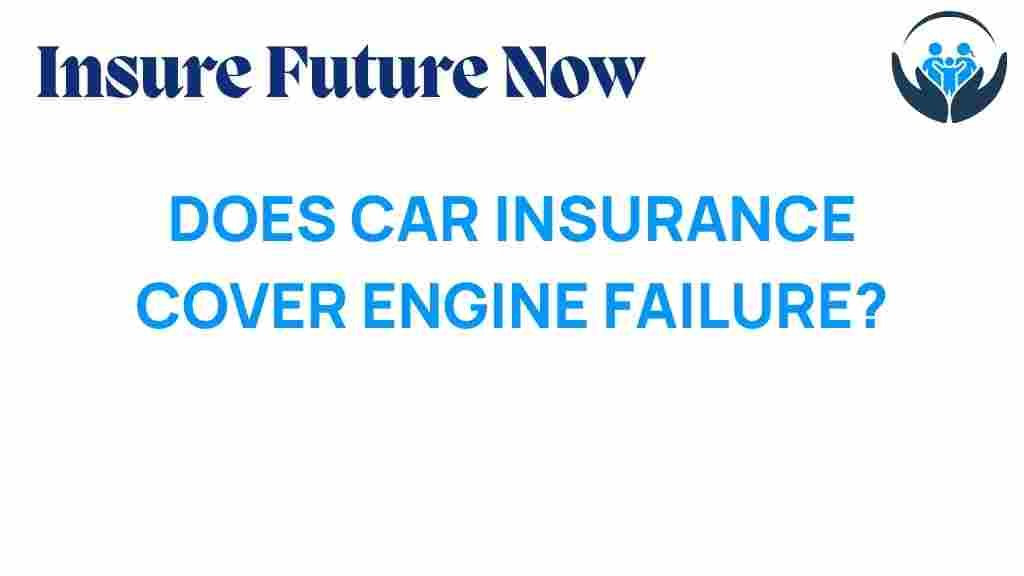Unraveling the Mystery: Does Car Insurance Cover Engine Failure?
When it comes to car ownership, few topics spark more debate and confusion than the intricacies of car insurance. One question that frequently arises is, “Does car insurance cover engine failure?” Understanding the nuances of your auto insurance policy can be tricky, especially when you encounter unexpected vehicle repairs. This article aims to clarify whether engine failure is covered by car insurance, what types of coverage are available, and how to navigate claims related to mechanical breakdowns.
Understanding Car Insurance Coverage
Car insurance is designed to protect you financially in the event of accidents, theft, or damages to your vehicle. However, not all types of vehicle failures fall under standard car insurance policies. Here’s a breakdown of typical coverage types:
- Liability Coverage: Covers damages to other vehicles or injuries to other people if you are at fault in an accident.
- Collision Coverage: Pays for repairs to your vehicle after an accident, regardless of who is at fault.
- Comprehensive Coverage: Covers damages to your car from non-collision events like theft, vandalism, or natural disasters.
- Personal Injury Protection (PIP): Covers medical expenses for you and your passengers after an accident.
- Uninsured/Underinsured Motorist Coverage: Protects you if you’re in an accident with someone who doesn’t have enough insurance.
While these coverages protect against various risks, engine failure often falls into a different category. Understanding this distinction is crucial when assessing your coverage options.
Engine Failure and Auto Insurance Policies
Engine failure can occur due to several reasons, including wear and tear, lack of maintenance, or manufacturing defects. It’s essential to note that most standard auto insurance policies do not cover mechanical breakdowns, including engine failure. Instead, engine failures are generally considered the owner’s responsibility unless specific coverage is included in your policy.
Mechanical Breakdown Insurance (MBI)
Some insurance companies offer a specific type of coverage known as Mechanical Breakdown Insurance (MBI). This type of coverage can help with the costs associated with repairs due to mechanical failures, including engine problems. Here’s what you need to know about MBI:
- Eligibility: MBI is usually available for new cars or cars that are still under warranty.
- Coverage: It often covers various mechanical failures, including the engine, transmission, electrical systems, and more.
- Claims Process: If you experience a mechanical failure, you would file a claim similar to other types of insurance claims.
Before purchasing MBI, it’s essential to review the terms carefully, as it may not cover pre-existing conditions or damages resulting from neglect.
Steps to Take If Your Engine Fails
If you experience engine failure, follow these steps to manage the situation effectively:
- Assess the Situation: Determine if the vehicle is safe to drive. If not, it’s best to call for roadside assistance.
- Document the Incident: Take notes and photos of the vehicle’s condition. This information will be helpful for any potential insurance claims.
- Consult a Mechanic: Have a professional inspect the engine to diagnose the issue and provide a repair estimate.
- Review Your Policy: Check your auto insurance policy to see if you have MBI or any additional coverage that could help with repairs.
- File a Claim: If you have MBI or relevant coverage, contact your insurance company to file a claim. Be prepared to provide documentation from the mechanic.
Common Causes of Engine Failure
Understanding the common causes of engine failure can help you take preventive measures. Here are some frequent culprits:
- Poor Maintenance: Regular oil changes and maintenance checks are vital for engine health.
- Overheating: Engine overheating can lead to significant damage. Always monitor your vehicle’s temperature gauge.
- Low Oil Levels: Insufficient oil can cause severe engine wear and tear.
- Fuel Issues: Using the wrong type of fuel or contaminated fuel can harm your engine.
Insurance Limits and Engine Failure
When considering car insurance coverage for engine failure, it’s important to understand insurance limits. Insurance limits dictate the maximum amount your insurance will pay for a claim. Here’s how it relates to engine failure:
- Deductibles: Most policies require you to pay a deductible before coverage kicks in. Ensure you understand your deductible amount.
- Policy Limits: Familiarize yourself with your policy limits, as they may affect how much you can claim for repairs.
- Exclusions: Review your policy for specific exclusions related to mechanical breakdowns or engine failures.
Troubleshooting Tips for Engine Issues
If you suspect engine problems, here are some troubleshooting tips to help you evaluate the situation:
- Check Engine Light: If the check engine light is on, use an OBD-II scanner to identify the error codes.
- Listen for Unusual Noises: Knocking or grinding sounds can indicate serious issues.
- Monitor Performance: Notice any changes in acceleration, power loss, or unusual vibrations.
- Inspect Fluids: Check engine oil and coolant levels regularly to catch potential problems early.
Conclusion
In summary, standard car insurance policies typically do not cover engine failures, as they are categorized under mechanical breakdowns. However, options like Mechanical Breakdown Insurance can provide coverage for engine failures and other mechanical issues. It’s crucial to review your auto insurance policy thoroughly, understand your coverage limits, and take preventive measures to maintain your vehicle.
If you’re facing engine issues, following the steps outlined in this article can help you navigate through the process smoothly. For more information on car insurance options and to find the best policies for your needs, consider visiting our resource page.
For further reading on auto insurance topics, check out this comprehensive guide on understanding your insurance needs.
This article is in the category Coverage and created by InsureFutureNow Team
